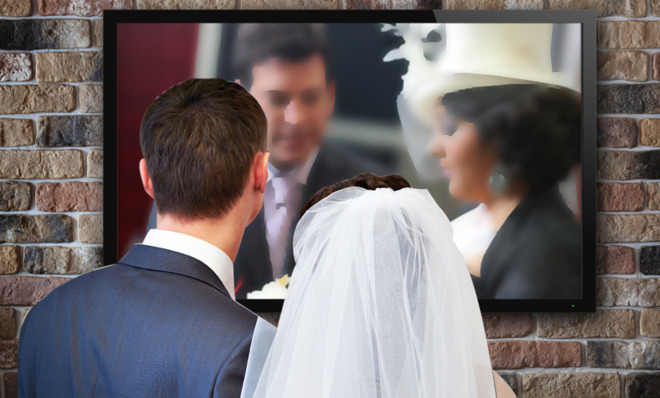Why I got married — without a wedding
As a seasoned viewer of wedding reality TV, I wanted out

A free daily email with the biggest news stories of the day – and the best features from TheWeek.com
You are now subscribed
Your newsletter sign-up was successful
Apparently dissatisfied with the sorry state of weddings, evangelicals want to reinsert Jesus into the celebration of marriage. Cue showy foot washing and bridesmaid regalia reminiscent of the crucifixion!
But can you really blame them? The traditional rituals of marriage have become so laden with artifice that it seems essential to bring back some semblance of meaning to the whole affair.
Well, the wedding industrial complex is all for it — and it has just the thing to sell you.
The Week
Escape your echo chamber. Get the facts behind the news, plus analysis from multiple perspectives.

Sign up for The Week's Free Newsletters
From our morning news briefing to a weekly Good News Newsletter, get the best of The Week delivered directly to your inbox.
From our morning news briefing to a weekly Good News Newsletter, get the best of The Week delivered directly to your inbox.
Like any industry raking in millions a year, the wedding industry is well served by a loyal stream of advertising selling the notion that your wedding defines not only you but also your relationship. By conflating the two, your average couple will thus blow about $10,000 to tie the knot.
And if you'd like to be apprised of the proper way to showcase your unique personality and the nature of your relationship, a slew of informative programming on reality TV awaits: Say Yes to the Dress, My Fair Wedding, Platinum Weddings, Rich Bride Poor Bride, Four Weddings — the list goes on.
OK, I confess: I'm a dedicated viewer of wedding reality TV. I spent hours in college huddled with my roommate on our couch binge-watching the weddings of strangers. In wedding reality TV, the proceedings of the planning process are made clear in a formal, predictable fashion that mirrors the familiarity of a procedural cop drama.
A viewer quickly comes to expect the particulars of preformed slots: There will be a dress, there will be décor, there will be a venue, there will be a ring, there will be food, and there will be entertainment. All of that goes without saying. The only question is, How will the personality of the bride and the nature of the relationship come to be grafted onto the products?
A free daily email with the biggest news stories of the day – and the best features from TheWeek.com
Usually the results are equal parts predictable and dreadful. A couple that met while scuba diving will wind up with waves imprinted on their custom invitations, and a bride who is fixated on her French heritage will end up serving pastel macaroons on a Parisian-themed dessert table. And Christians get to wash feet!
But what makes wedding reality TV so much like an autopsy is how coldly calculated the process is: One can watch My Fair Wedding's David Tutera meditate at length on how to compress a personality into a product that can be purchased and consumed, and then observe as he travels to dealerships, industrial bakeries, and warehouses to buy the sundry parts of a couple's congealed love and individuality.
Most of it turns out to be disposable: mounds and mounds of paper in the form of invitations and place cards; a dress that will be worn a single time; a venue that will be opulently appointed only to be swept into dumpsters by custodial staff. It's the dark side to the wedding as the ultimate expression of a couple's love: At the end of the day, all of the products are ephemeral, and a new episode will air next week.
Wedding reality TV is perhaps the most frank segment of the wedding-industrial complex: The truth is that the lion's share of contemporary weddings is pure show. As a seasoned viewer, I opted out.
Since marriage is, for the religious person, bifurcated into the civil and sacramental, I had two very small ceremonies with only my husband and a couple of witnesses, and we purchased nothing in the way of special clothes or décor. We celebrated with friends and family in small batches when we saw them, but ultimately have nothing in the way of memorabilia — no photography, no carefully mummified gauzy gown, no cake topper crusting in a drawer somewhere. Just us, married.
Had I never been exposed to the guts of the wedding-industrial complex, I probably would have despaired at the lack of keepsakes. But now I view it as one less thing to throw away, and all the more to remind me that marriage is something here and now, every day, not something you celebrate with one giant blowout. It’s something I prefer to associate more with the personal and the permanent rather than the marketable and temporary, an option that might come as a relief to those otherwise scrambling to find authenticity in a modern veneer.
-
 Will increasing tensions with Iran boil over into war?
Will increasing tensions with Iran boil over into war?Today’s Big Question President Donald Trump has recently been threatening the country
-
 Corruption: The spy sheikh and the president
Corruption: The spy sheikh and the presidentFeature Trump is at the center of another scandal
-
 Putin’s shadow war
Putin’s shadow warFeature The Kremlin is waging a campaign of sabotage and subversion against Ukraine’s allies in the West